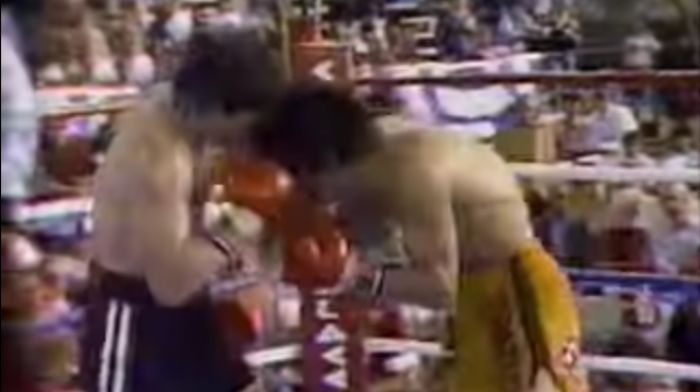
It’s not lost on fans that the “Sweet Science” is also brutal. So brutal, in fact, that not everyone gets to go home after several rounds of flying fists. Unfortunately, that was the case for Duk Koo Kim, who in 1982 met the furious freight train that is Boom Boom Mancini.

The Stage is Set
It was November 13, 1982, and the boxing world was focused on a bout that was destined to be memorable. The reigning WBA lightweight champion, Ray “Boom Boom” Mancini, was set to face the challenger, Duk Koo Kim, a South Korean fighter looking to make a name for himself on American soil.
Mancini, a charismatic Italian from Youngstown, Ohio, had captivated the hearts of many fans with his relentless style and determination. It didn’t hurt that his father Lenny was also a popular boxer with the epic moniker “Boom Boom.”
Kim, on the other hand, was relatively unknown but determined to prove himself on the grandest stage. And he was no slouch – his amateur and professional records showed just five losses to 36 wins.

RELATED: Mayweather Vs. McGregor: A Collision Of Titans And How It Impacted Combat Sports Forever
A Brutal Battle Unfolds
The fight began with all the makings of a classic. Both fighters exchanged heavy blows from the start. Mancini’s relentless pressure and aggressive style clashed with Kim’s counterpunching tactics. It was a brutal back-and-forth affair, with neither man willing to back down.
Boom Boom had seen this coming. Maybe the sporting press wasn’t so sure about Kim, but Boom Boom said after hearing about Kim’s routine, “We’re going to have a war, no doubt about it.”
And war it was. Back in those days, fights could go 15 rounds. It was this very fight that lowered the maximum number of rounds to 12. A change that could have, might have, saved Kim’s life.
The pivotal moment in the match came in the 14th round. Mancini landed a devastating combo to Kim’s head, causing him to collapse to the canvas. Unbeknownst to perhaps everyone, Kim was dying. But that didn’t stop him from lifting himself off the canvas and up to the ropes. As commentator Ralph Wiley described it, “One of the greatest physical feats I had ever witnessed.”
But Kim was dying. The referee stopped the fight as Kim fell back on the ropes, declaring Mancini the winner by TKO.
The victory was hard-fought, but it came at a heavy price.
Tragedy Strikes
Following the fight, Duk Koo Kim was taken to the hospital, where it was discovered he had sustained a subdural hematoma, a life-threatening brain injury. Tragically, Kim fell into a coma and passed away just five days after the fight.
The aftermath of Kim’s death sent shockwaves through the boxing world and led to increased scrutiny of the sport’s safety measures and regulations. It was a stark reminder of the risks that fighters face each time they step into the ring. They don’t always get to go home.
The Legacy of Boom Boom and Duk Koo Kim
The Mancini vs. Kim bout is a bittersweet chapter in the history of boxing. It’s a testament to the courage and determination of fighters like Mancini and Kim, and the sacrifices they make for their love of the sport.
As rock legend Warren Zevon would later memorialize the fight in his song “Boom Boom Mancini”:
When they asked him who was responsible
For the death of do Koo Kim
He said, “Someone should have stopped the fight
And told me it was him.”They made hypocrite judgements after the fact
But the name of the game is be hit and hit back
It also serves as a reminder of the importance of safety and medical protocols in boxing.
Boom Boom carried the weight of that fight with him. He paid tribute to Duk Koo Kim by visiting his grave, and he became an advocate for improved safety standards in boxing.
The clash between Mancini and Kim will forever be remembered as a poignant moment in the sport’s history, one that highlights both the glory and the tragedy that can unfold in the ring.
Duk Koo Kim: July 29, 1955 – November 18, 1982